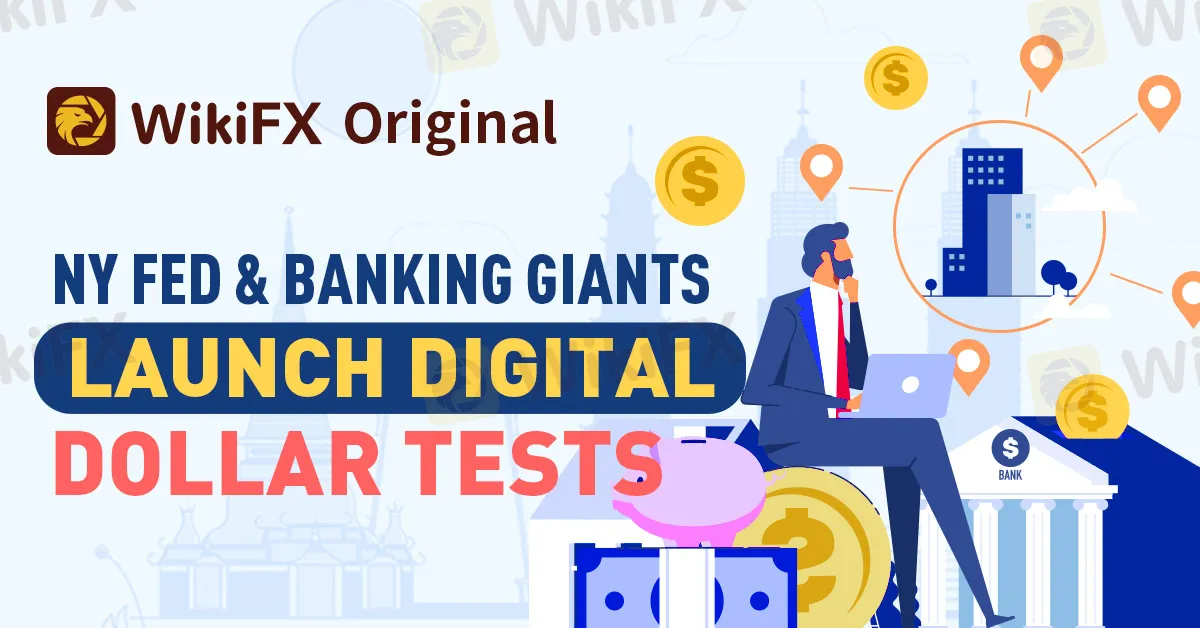简体中文
繁體中文
English
Pусский
日本語
ภาษาไทย
Tiếng Việt
Bahasa Indonesia
Español
हिन्दी
Filippiiniläinen
Français
Deutsch
Português
Türkçe
한국어
العربية
NY Fed & Banking Giants Launch Digital Dollar Tests
Abstract:In the midst of FTX’s messy collapse, some of the big names in the financial industry are launching a digital dollar program to experiment with the use of digital tokens in representing digital dollars in order to improve the settlement of funds between banking institutions.

The project represents the biggest leap in the development of a digital dollar to facilitate financial settlements. The Biden administration has suggested a digital dollar, and the United States has just started to invest resources in the project. Other nations are also considering developing their own central banks for digital currencies (CBDCs).
The proof-of-concept study will evaluate the viability of the regulated liability network, an open-source, interoperable digital currency platform (RLN). It will make use of a shared distributed ledger, similar to the blockchain used by bitcoin. Central banks, commercial banks, and regulated non-banks will all be involved in the effort to improve financial settlements.

The Federal Reserve Bank of New York and a group of about a dozen international behemoths, including Citigroup, HSBC, Mastercard, BNY Mellon, PNC Bank, TD Bank, and Wells Fargo, revealed plans on Tuesday to test the usage of a digital token for a period of 12 weeks to see how well it speeds up payments. International messaging service provider, SWIFT, is also a part of the project.

All participating firms will be using simulated data in a test environment with bank-issued digital dollar tokens. There are hopes that following this project's success, it could expand to cover multicurrency operations and stablecoins.

However, the Centre also clarified that the research is not intended to advance any particular policy goal. Additionally, the regardless of its success or failure, the project does not indicate that the Federal Reserve would take any immediate conclusions about whether it is suitable to issue a retail or wholesale CBDC, nor how one would necessarily be designed.
Michelle Neal, head of the New York Fed's market group, stated earlier this month that the central bank sees potential in utilizing a digital dollar to shorten settlement times in currency markets. A noteworthy announcement might occur as early as next year as a result of the White House's recommendation to create a digital dollar. Major economies like India are also thinking about implementing CBDCs. The current initiatives are mostly conservative test projects. Simultaneously, regulators from all across the world are considering how to govern cryptocurrencies.

Disclaimer:
The views in this article only represent the author's personal views, and do not constitute investment advice on this platform. This platform does not guarantee the accuracy, completeness and timeliness of the information in the article, and will not be liable for any loss caused by the use of or reliance on the information in the article.
Read more

Terraform Labs Co-founder Do Kwon Extradited to the U.S. to Face Fraud Charges
Montenegrin authorities have transferred Do Kwon, co-founder of Terraform Labs, to the United States, concluding an extended legal battle over his extradition

Bithumb CEO Jailed and Fined Over Bribery Scheme in Token Listing Process
Lee Sang-jun, the former CEO of Bithumb, South Korea’s largest cryptocurrency exchange, has been sentenced to two years in prison and fined 52 million won ($35,367) for his involvement in a bribery scheme that manipulated the platform’s token listing process.

MoonPay Among the First Companies Approved Under MiCA Regulation
MoonPay receives MiCA license in the Netherlands, enabling EU operations under stricter regulations.

China's New Forex Rules Target Cross-Border Crypto Trading
China's new forex rules tighten monitoring of cross-border crypto trades, requiring banks to track identities, fund sources, and trading frequencies.
WikiFX Broker
Latest News
Will Gold Break $2,625 Amid Fed Caution and Geopolitical Risks?
Vietnamese Police Bust $1.2 Million Crypto Fraud Case
WikiEXPO Global Expert Interview: Loretta Joseph——Unlock the forefront of digital finance
XTB Receives Licenses to Operate in Indonesia & UAE
SEBI Bans Big "Finfluencers for Misleading Investors"
WikiFX New Year Bash: Chance to Win 70 USDT
ECB Targets 2% Inflation as Medium-Term Goal
New Year, New Surge: Will Oil Prices Keep Rising?
Will Gold Shine Brighter in 2025?
WikiFX Review: Is HYCM still reliable in 2024?
Currency Calculator






